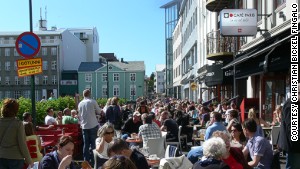Much about the art and science of the consumer market is mysterious, but nothing's stranger than the seeming popularity of those coffee-pod brewing contraptions sold under brand names such as Keurig.
Here's what's strange about them: First -- speaking with the authority of a coffee devotee with my own genuine Italian espresso machine at home -- the coffee they make is horrible. Second, it's ridiculously expensive.
Keurig uses plastic and foil pods filled with about 10 grams of ground coffee each (some are less, some "bold" brews are a little more), which are placed in the brewing device, automatically pierced with a needle, and inundated with hot water. The coffee-making process is mess-free. That's the good news, but once you've said that you've said everything. The result is typically a flavorless brew of brown hot water. The pods are discarded after a single brew, creating a detestable volume of non-recyclable packaging waste.
Keurig's single-serve pods, or K-Cups, sell on its website in packs of 24 for about $16.50. That's about $30 per pound of coffee; the price for some blends licensed from Starbucks can approach $50 per pound.
For comparison, at Peet's you can get a pound of top-flight fresh Italian or French roast for $15. For the same sum, Keurig will sell you half a pound of Folgers, which you can find in canisters at Wal-Mart for less than five bucks per pound.
How do you spell "sucker"?
We're witnessing, of course, an ancient trick in consumer marketing: slice the baloney thinner, and you can charge much more per slice. A friend of mine once calculated, based on the price of a plastic box of Tic-Tacs, that he was spending the equivalent of $16 for a pound of sugar. (A 5-pound sack of raw sugar at Wal-Mart: $2.62.)
Vermont-based Keurig Green Mountain knows that consumer acceptance of its high-priced coffee pods is poised on a knife edge. This became especially clear after key patents on its K-Cups expired in 2012. Unlicensed companies jumped into the K-Cup market, and refillable K-Cups even appeared, allowing you to spoon bulk Folgers into a little basket and brew your brown water on the cheap.
Keurig's latest strategy is to use techology to freeze out competitors. According to Chief Executive Brian Kelley's statement on a recent earnings conference call, its Keurig 2.0 brewing machines will use "interactive technology" to accept only Keurig-approved pods. Think of it as DRM for coffee.
The idea, the company said, is to ensure the system produces "excellent quality beverages, (to) produce simply and consistently every brew, every time."
It also said it would roll out the new technology in a "consumer friendly" way. Why doubt them? They've got millions of customers already believing their coffee is good; to get that experience "consistently" should please the Keurig faithful no end.








